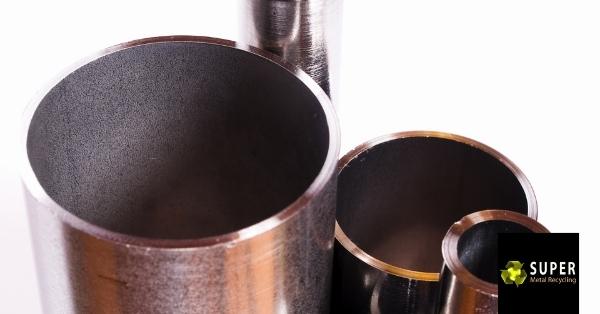Steel is a remarkably versatile construction material, and it is used for a lot of things, including buildings, railway lines, and the framework or support for large structures. The reason it is so versatile is its unique makeup, which allows it to be formed, using heat or cooling methods, into useful shapes. It is strong too, able to withstand extreme temperatures and winds.
Steel is made of a combination of iron and carbon, but did you know there are more than 3,500 different grades of steel? The grade is determined by the amount of carbon, what other alloys the steel contains, and the way it has been processed.
In this guide, we’ll go over some of the types and graded of steel you are most likely to come across, plus share with you the best way to buy and sell scrap metal steel.
What are the four different types of steel?
Steel is split into four groups: Carbon, Alloy, Stainless, and Tool. Then each of these types is also classified/graded to show what it contains and how much of different properties are within it. That way, the correct steel is used for the task at hand.
Carbon Steels
This type of steel only contains trace amounts of elements besides carbon and iron. Around 90% of steel falls into this category, making it the most common. However, carbon Steel is also divided into three subgroups depending on the amount of carbon in the metal: Low Carbon Steels/Mild Steels, Medium, and High. We look at these in more detail below.
Alloy Steels
These contain alloying elements like nickel, copper, chromium, and/or aluminium to change the metal’s strength, ductility, corrosion resistance, and machinability.
Stainless Steels
Stainless steel is becoming one of the most popular recyclable materials. It contains around 10–20% chromium as an alloy and are highly resistant to corrosion. These steels are commonly used in medical equipment, piping, cutting tools, and food processing equipment as well as a popular choice for kitchen appliances.
Tool Steels
These contain tungsten, molybdenum, cobalt, and vanadium to increase heat resistance and durability. This makes them great for tools, especially cutting and drilling ones.
What are the different steel grades?
As there are so many (over 3,500) different grades of steel out there, we have only covered the most common groups below, plus what they could be used for.
Mild Steel
This steel usually contains less than 0.25% of carbon and insignificant amounts of alloying elements. Its price is usually low making it very common and it’s used in many ways including welding and construction structures.
High Yield Steels
High yield steel is another low carbon steel (also typically containing less than 0.25% of carbon). However, it is stronger thanks to the addition of manganese and/or vanadium. Occasionally small amounts of molybdenum, niobium, and titanium are also added to increase strength and durability.
Carbon Steels
This type of steel is generally very strong with high levels of wear resistance. It can be heated to create tools and the more carbon it has the more likely it is to be used for making things that require more strength or durability like string steel or high-powered drilling tools.
Boron Steels
Boron steel can be processed at high temperatures by heating in a furnace and pressing whilst still hot, using a cooled tool. Because it cools quickly, its microstructure changes to create very hard, tough, and durable steel. It’s often used to make parts that will get a lot of wear or to protect other parts of a construction from wear and tear.
Engineering Steels
These are sometimes called Special Bar Quality steels. They often contain higher-quality carbon and alloys and are frequently used in industries for the production of automotive parts, hand tools, electric motor shafts, and valves.
Super Metal Recycling is based in Dandenong, Victoria, servicing for all types of Scrap Metals, Unwanted Cars, Junk Cars, Free Car Removals, Wrecked Cars, Smashed Cars, throughout Melbourne Metro areas. We offer cash for Scrap Cars, specialise in Old Car Removals, Car Wreckage Removal, Recycling of old cars and Scrap Metal Recycling.
If you are at Beaconsfield, below is the best way to visit us.


Recent Comments